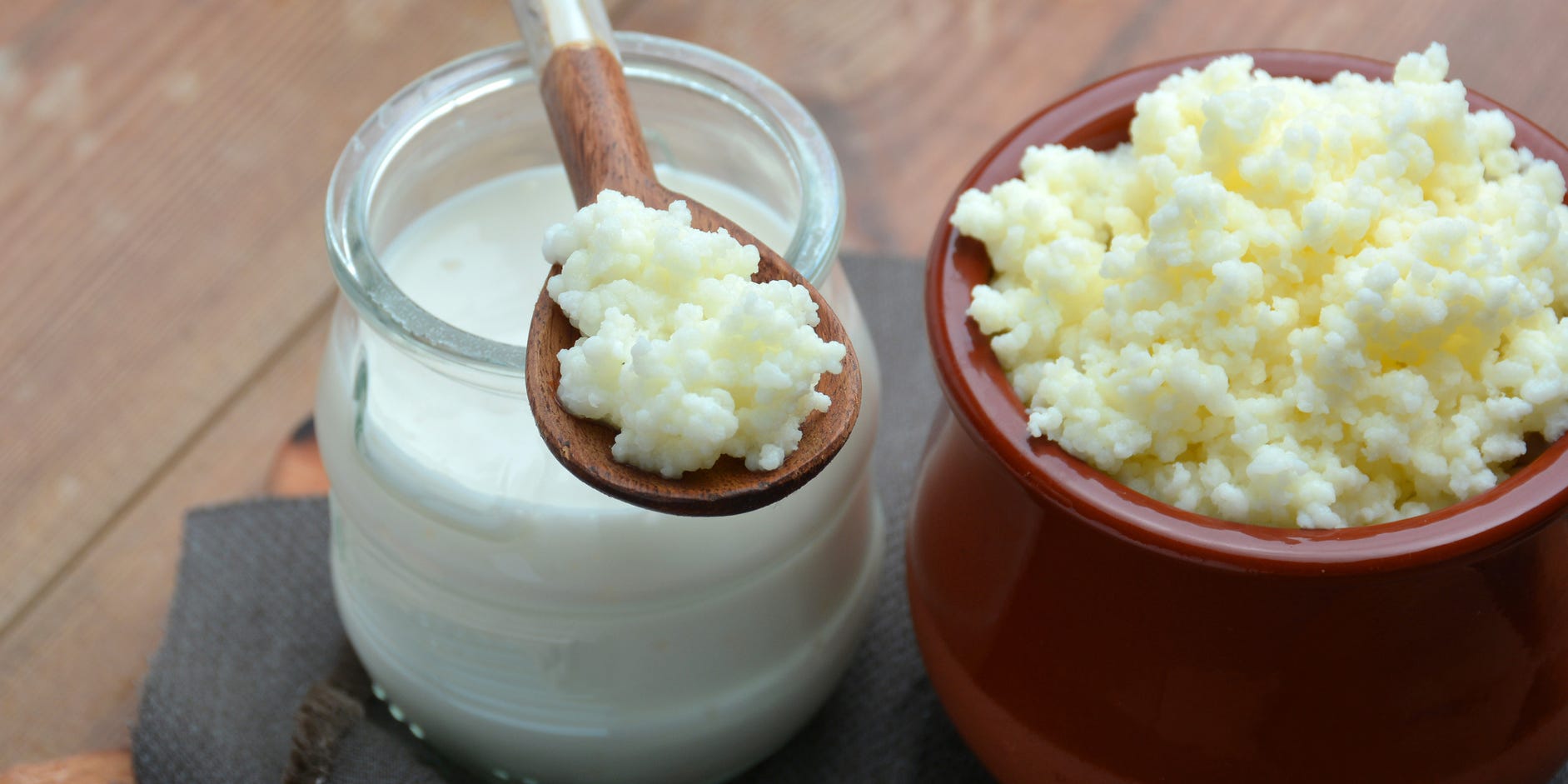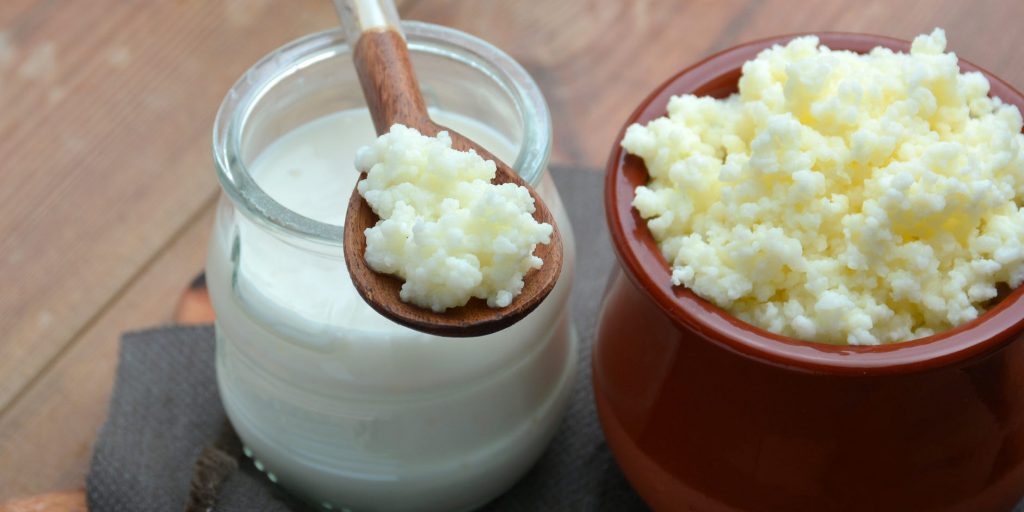
istockphotoluis/Getty Images
- Kefir is a probiotic-rich drink made from milk and kefir grains.
- Benefits of kefir include supporting gut health, strengthening bones, and helping with weight loss.
- However, kefir may carry some risks for people with lactose-intolerance or who are immunocompromised.
- Visit Insider's Health Reference library for more advice.
As interest in probiotics has surged during recent years, so has the popularity of kefir – a fermented dairy drink rich in gut-friendly bacteria that support digestion, immune function, and nutrient absorption while keeping harmful pathogens in check.
This beverage comes with a number of touted health benefits, from promoting bone health to helping with blood sugar management.
Here's what to know about kefir, and how it may impact your health.
What is kefir?
Kefir is a fermented drink made by adding kefir grains to milk, and then letting it ferment for about 24 hours.
During this time bacteria and yeasts in the kefir grains turn the sugars in milk into lactic acid, making it taste slightly sour, says Tayler Silfverduk, a registered dietitian with a private practice.
Thanks to its creamy yet thin consistency and uniquely tart taste, kefir is often compared to drinkable yogurt, says Silfverduk.
You can buy kefir plain or in a wide variety of flavors, like vanilla, blueberry, and strawberry at most supermarkets or health food stores like Whole Foods, Costco, Trader Joe's, and Publix.
There are a few different types of kefir, including:
- Milk kefir, which is the most common type in stores, and the one discussed in this article. It is traditionally made with cow's milk, but can also be made with goat, sheep, or soy milk.
- Water kefir, which is dairy kefir made with sweetened water, juice, or coconut water in place of milk.
- Kefir grains, which are the colonies of bacteria used for fermenting water or milk. They are similar to a SCOBY starter for kombucha.
Thanks to its impressive nutritional profile, it's no surprise kefir has many potential health benefits, such as:
1. Supports gut health
Kefir has more probiotics than yogurt, says Elle Wittneben, a registered dietitian with Greater Boston Urology - and it also boasts a diverse range of bacteria strains.
In fact, a small 2021 study found that people on a diet high in fermented foods for 17 weeks experienced a greater increase in overall bacteria diversity than those on a high-fiber diet. Those "good" bacteria may help improve digestion and mental health.
2. Builds and maintains strong bones
Full-fat kefir is an excellent source of calcium. Calcium plays a key role in strengthening and maintaining your bones, thereby warding off osteoporosis.
Many kefir products are also fortified with vitamin D, according to Wittneben, which also plays an important role in protecting your bones by helping you effectively absorb calcium.
A small 2015 study found that osteoporotic patients who drank kefir for six months experienced greater increases in bone mineral density - a key measure for overall bone health - than those who just took a calcium supplement.
3. May control blood sugar
While more research is needed on kefir's role in managing blood sugar, so far results seem promising.
For example, a small 2015 study found that people with type 2 diabetes who drank kefir as opposed to conventional fermented milk had reduced fasting blood glucose and HbA1C levels - in other words, lower blood sugar.
It's important to note, however, that the added sugar in many flavored kefir products could cancel these benefits out. So if you have diabetes or another related condition, be sure to buy plain kefir without added sugar.
4. May help with weight loss
Thanks in part to a high amount of satiating protein, kefir may help with weight loss.
Some bacteria, like those in the Lactobacillus family, have been found to increase the amount of fat excreted in the stool of healthy Japanese subjects, meaning their bodies absorbed less fat.
A 2016 study found overweight and obese women on a dairy-rich, non-calorie restricted diet who consumed either two servings of kefir drinks daily or low-fat dairy products for eight weeks had far greater reductions in weight, body mass index, and waist circumference than those who did not drink the kefir. However, since there was no difference between the kefir and low-fat dairy groups, this benefit could be attributed to dairy products in general.
5. Has antibacterial properties
Multiple studies have demonstrated that kefir shows antimicrobial activity against some pathogens, but it's important to note that these studies have not been conducted in humans.
Additionally, a 2014 study in animals found that one of the probiotic strains that's unique to kefir, Lactobacillus kefiri, can impede the growth of certain harmful bacteria, including salmonella. Kefir also contains a type of carbohydrate known as kefiran that has been shown to have antimicrobial effects in animal studies.
Are there health risks of kefir?
Kefir is safe for most people to drink, and dietitians advise starting with 1 cup per day when first introducing it to your diet. Otherwise, a dramatic increase in probiotics could cause gas, bloating, and other unpleasant digestive symptoms.
Even people with lactose intolerance may drink it since the fermentation process converts the lactose in milk into lactic acid, which is easier to digest for lactose intolerants, says Silfverduk. However, since kefir is still technically a dairy product, look for kefir that's 99% lactose-free or made with non-dairy alternatives, to avoid symptoms such as bloating, gas, and stomach cramps.
While it's been suggested that the live bacteria in products like kefir could make those who are immunocompromised more vulnerable to infection, chances are extremely rare.
If you're immunocompromised, Wittneben says up to one serving of kefir a day should be safe but advises consulting with your doctor before trying kefir.
Insider's takeaway
Kefir is a creamy, tart-tasting fermented beverage that offers many potential benefits - thanks primarily to the fact that it's rich in diverse probiotics.
In addition to supporting gut and bone health, kefir may also help with blood sugar regulation and weight loss.
While it's safe for most people to drink one to three servings of kefir daily, you should consult your physician before trying kefir if you have a suppressed immune system or lactose intolerance.
